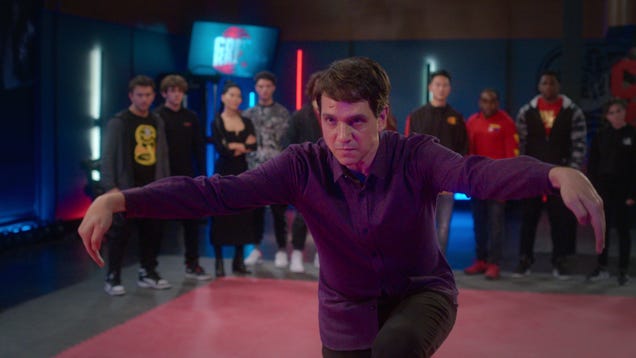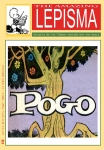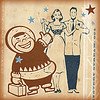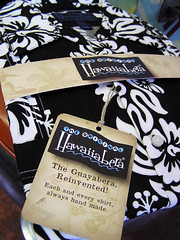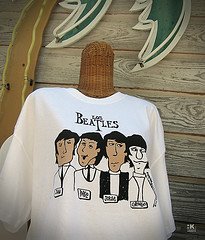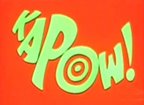Monday, March 21, 2005
Read. Digest. And Pass On.
iPod Therefore iAm
Ordinary people narrowcast; always have, always will. It's human nature to want to surround ourselves with like-minded people, familiar music, comfortable art, and unchallenging surroundings. Who can be surprised that our technology reflects this basic impulse?
Andrew Sullivan, that's who. In his recent essay, "iPod World: The End of Society?" Sullivan broods over the popularity of America's new favorite gizmo, the iPod:
"Americans are beginning to narrowcast their own lives. Technology has given us finally a universe entirely for ourselves -- where the serendipity of meeting a new stranger, or hearing a piece of music we would never choose for ourselves, or an opinion that might actually force us to change our mind about something are all effectively banished. Atomization by little white boxes and cell-phones. Society without the social. Others who are chosen -- not met at random.
"Human beings have never lived like this before."
On the contrary: human beings have always lived this way. Until very recently, most people lived their lives -- culturally and otherwise -- within the confines of small homes, small towns, and small places. Geography dictated your language, religion, political beliefs, cultural preferences, and artistic tastes. You didn't need a cell phone or an iPod or an Internet connection to link up with your tiny little subculture -- you just needed to get out of bed in the morning. To be sure, there was room for variety within geographical areas -- but for most of human history, location was destiny. Cultural jostling was largely restricted to merchants, soldiers, peripatetic clergymen, and perhaps the very rich. And while the constriction of cultural experience was hardly ennobling or intellectually fulfilling, it doesn't appear to have made most people miserable.
The history of the modern world is the history of culture transforming from a geographical phenomenon into an ideological phenomenon. As information technology has blossomed, ideas no longer rely upon locations for transmission. But while the unit of atomization in the bad old days was the small community, the unit of atomization in the present is the individual. Either way, the constant is atomization.
Human beings are parochial animals; in the modern age, we dwell in parishes of the mind. Sooner or later, one form of homogeneity replaces another. The old differences -- North vs. South, city vs. country, black vs. white -- give way to the new: Red America vs. Blue America, investor vs. consumer, new wave vs. old school. We select our style of narrowness, but the narrowness never changes.
And what's wrong with a little narrowcasting, anyway? Social life is a difficult thing -- fraught with awkwardness, quirky taboos, the fear of rejection, and the discomfort of confrontation. The unfamiliar and the unexpected can stimulate but they can also exasperate -- and exacerbate ill will. We surround ourselves with the familiar and unthreatening precisely because ordinary life is threatening enough, even within the confines of the familiar. To be sure, a select few will always strive to broaden their cultural horizons -- but then, a belief in the value of broadened cultural horizons is itself a cultural position, and a surprisingly comfortable one at that.
The question is not whether we will narrowcast our lives. The question is how to create a broadcast society out of narrowcast people.
Our true concern is not cocooning, but rather the intellectual indolence that it permits. It's fine to surround ourselves with the familiar and unobtrusive, provided that we use that comfort to create a mental space for reasoned, virtuous reflection. If every New York iPod zombie engaged his or her chosen style of music in a focused, intelligent way, we wouldn't mind the rise of the iPod a bit. But it seems likely that the familiarity of our favorite iPod tunes isn't making civilized thought easier -- it's allowing civilized thought to be avoided altogether. How many iPod-heads poison their brains with soulless pop drivel because it's the same crap to which they've always listened? As Christine Rosen warns in her New Atlantis article, "The Age of Egocasting:"
"TiVo is God's machine, the iPod plays our own personal symphonies, and each device brings with it its own series of individualized rituals. What we don't seem to realize is that ritual thoroughly personalized is no longer religion or art. It is fetish. And unlike religion and art, which encourage us to transcend our own experience, fetish urges us to return obsessively to the sounds and images of an arrested stage of development."
But fetish is an old enemy. Since time out of mind, most people stayed in the village because it was easier than venturing out into the city. Most people thoughtlessly accepted whatever music the cultural elites presented at the orchestral performances, or whatever art the smart-set displayed at the museums. Even today, most people accept the religion, culture, and mores of their upbringing without question. Do iPods encourage fetishes, or simply transform them?
Perhaps the new and the unfamiliar are just as likely to close the indifferent mind as to open it. Perhaps iPods are merely symbols of the insularity that characterizes the average intellect.
Sullivan identifies the real problem later in his essay:
"But what are we missing? That hilarious shard of an over-heard conversation that stays with you all day; the child whose chatter on the sidewalk takes you back to your own early memories; birdsong; weather; accents; the laughter of others; and those thoughts that come not by filling your head with selected diversion, but by allowing your mind to wander aimlessly through the regular background noise of human and mechanical life."
The iPod is a tool of choice. With it, we can download exactly the music that we choose, and play it when we choose, and where we choose. And ours is a nation swooning over the joys of choice. We learn the lesson over and over, in movies and TV shows and commercials: be yourself. Do what you want. Don't live by the rules and expectations of others. Pursue your own destiny. What we forget -- but what Sullivan remembers -- are the joys of not choosing. To accept what life offers, not numbly but deliberately, placing our beloved autonomy into abeyance, is to open the door to unforeseen surprises, happy coincidences, and profound affirmations. Good as it is to choose who we love, it is even more intoxicating to be chosen. Good as it is to seek out what we like, it is just as pleasant for what we like to seek us. And given our society's endless fascination with questions of identity, it seems that we are desperate to find those qualities of ourselves that are unchosen, unchanging, and fundamental. As our tools for choosing grow ever more powerful, our hunger for the unchosen can only increase.
I am not afraid of iPod nation. I am not so naïve as to think that good music will triumph over awful music. I am not so optimistic as to forget that we lose something vital when choice barricades the walls of our minds against the adventure of the unknown and unselected. And I accept that every iPod-like innovation tips the scales a little further in the direction of the chosen over the unchosen -- a dangerous trend in an era when choice always seems to win. But like everything else in modernity, iPods have increased our capacity to take pleasure in our unique pursuits, even as they have increased our responsibility to choose our pursuits wisely. Will we live up to that responsibility? Maybe so, maybe not; either way, the fault, dear Andrew, dear Christine, lies not within our iPods, but within ourselves.
As far as music goes, there are entire galaxies of music beyond planet Clear Channel. Do yourself a favor and sample some home grown antigravity by simply going left of your radio dial and tuning into your local college or NPR station. I like to refer to it as What's Left of The Dial.
Listen. Digest. And Pass On.
That's Right.
Thanks to Douglas Kern
Saturday, March 19, 2005
Your Music Collection: Rent or Own?
The latest NAPSTER commercial offers the following comparison. On top, there is a single iPod. The cost to fill it, Napster says, is $10,000. Beneath it are three MP3 players: the Dell Pocket DJ, the Creative Zen Micro and iRiver's new H10. With Napster to Go, the commercial says, you can fill all three with almost any song you can think of and you're out only $15.
Next to that, in tiny print, are the words "per month."
Ordinarily such a lopsided comparison would make me cringe and conclude that it was aimed at the gullible. But this one made me re-examine my life.
Napster to Go is the latest edition of Napster's legal download service. (Although it was previewed to the public last fall, the software allowing small portable music players to work with it has become available only in the last few weeks.) A vast majority of the available tracks - Napster says 1.3 million - can be downloaded by subscribers without paying additional fees.
What makes Napster to Go different from other subscription services, like Rhapsody ($10 a month) from Real Networks, is that you can load these tracks onto a compatible player and hit the road. As long as the player reconnects to the PC every month to verify your subscription, it feels just like the more common alternative, the one-time à la carte cost of $1 per track or $10 per album.
Of course, the commercial doesn't say you will lose access to music if you stop paying. And Napster's $10,000 reckoning also assumes that everything on an iPod is purchased at the iTunes Music Store. In reality, you could have plenty of MP3's already, from ripping CD's and dredging the Internet.
But the commercial raises a good question: Will you rent albums the way you rent TV programming? If it makes financial sense - and if, armed with that knowledge, you can avoid the competing allure of iPod style and the Apple brand - you just might.
Since Apple opened its iTunes store at the end of 2003, I've purchased 504 songs - that's 21 albums and 224 loose tracks. That means my music diet, excluding a dwindling number of old-timey CD purchases, comes to roughly $30 a month.
Most of my spending has been satisfying: new releases from U2 and Jack Johnson are simply essential, and impulse buys like the Postal Service's "Give Up" and Better Than Ezra's "How Does Your Garden Grow?" have become staples of my week. But many hunches and recommendations got old fast.
More frustrating still, there are hundreds of tracks I've just been too cheap to check out. Even though I have a permanent collection of about 7,000 MP3's - compatible with any service and player - $15 a month is still less than what I spend discovering new music.
Parents with children ages 10 to 20 know how costly the digital music revolution can be. If you look the other way as they download music using ... let's call them gray-market techniques, your PC becomes irreversibly crippled by spyware. But when you try to encourage them to pay for music instead of stealing it, you quickly discover that even a two-album-a-month allowance adds up.
When used to its fullest extent, Napster to Go lays iTunes flat, financially speaking. For the $15 monthly fee, you're allowed unlimited downloads. You can put them on up to three compatible portable players, and log in and listen on up to three PC's. (Napster to Go does charge by the song, however, to burn music to a CD.) Sure, there's an initial investment, and in homes with more than three listeners they'll have to share, but for a low fixed price they can all download as many songs as they want, most of which they will soon forget about anyway.
The value proposition is in place. I know I can get tons of music, but can I get tons of good music? There are bands not yet online at all, like the Beatles, Led Zeppelin and AC/DC. But with Napster to Go there is a new discrepancy: songs you must purchase outright, ones that aren't part of the all-you-can-have subscription deal.
I hit Napster thinking that maybe half of the tracks I'd want would be "buy only." To my amazement, it was less than a tenth. Heavies like Paul Simon, Pink Floyd, Prince, Bruce Springsteen and even, yes, Metallica have made their entire catalogs available for subscription download. The subscription service makes sense for Pearl Jam, which has posted over 80 separate live recordings. Sure, some people bought them before, but now even those without Eddie Vedder tattoos will have a chance to check them out.
I'm not saying that you won't stub your toe against tracks that don't budge until paid for individually. But between your own music collection and what is available, it's easy to see how to build up your core library.
The magic of the subscription plan is that music you don't know is also covered. I got to see if I liked new cuts from the Killers (yep) and Gwen Stefani (nope). Sitting in judgment didn't mean sitting in front of a computer screen, either; I could do it in the driver's seat of my car.
The trouble is, that thing next to me wasn't my trusty iPod. A switch to Napster means kissing your iPod, or any prospect of getting one, goodbye. The Napster-compatible players, at the moment, are the ones from Creative, iRiver and Dell that I tested, as well as others from Samsung, Gateway and Audiovox, ranging in price from $180 to $500. What they have in common is a piece of hardware allowing this sort of subscription content to be used under a Microsoft-powered secure-content system.
I could easily dismiss the players friendly with Napster to Go, but most of my gripes merely translate into this boilerplate: They're not iPods.
More substantial are my complaints with Napster's PC software, which tends to jerk the user around in a very unstable fashion. It takes its sweet time reacting to mouse clicks, and mundane maneuvers make it freeze for minutes. Players often ominously "stop responding" in the middle of something important. It's possible to load the same tracks onto a player twice (an act iTunes most sensibly prohibits). Once you get the hang of the Napster service, a smart move is to use the more stable Windows Media Player 10 as your music manager instead.
For the most part, however, the software and the players do their jobs. So let me ask a question that some may consider heresy: How necessary is the iPod?
I recently discovered (with some horror) that I could live without TiVo. Time Warner Cable offered a box with better picture quality at a better price - about $9 a month with nothing up front. Compared with TiVo, the new box's interface is medieval dentist painful to use, but I use it and I don't look back.
If I could jump from TiVo to Time Warner, a switch from the iPod to the Creative Zen Micro ought to be easy by comparison. Yes, the iPod is a beautiful symbol of how cool I am, but an iPodectomy is scientifically possible.
Thankfully, an iPodectomy may not be necessary. Buzz on the Internet and in the industry suggests that Apple may be planning a retaliatory move, an iTunes to go. There are also good odds that Yahoo and Real Networks will soon join the melee.
Though it seems like a lopsided deal - paying less than what Target charges for a CD and getting almost any musical wish granted instantly - the record industry is lobbying hard to make subscription services the next phase in the digital revolution. The labels are using them to get the attention of 15- to 25-year-olds, the group most responsible for the sharp decline in CD sales over the last few years (not to mention the rise of illegal file sharing).
"We are very pleased to welcome this group into paying for music again," says Adam Klein, executive vice president for strategy and business development at EMI. Mr. Klein also tipped me off to another source of industry optimism: early research has shown that people who pay monthly to sample all music are still likely to pay extra to own some of it outright.
At the moment, that makes sense. Pay a nominal fee to taste everything, then spring for the stuff you can't live without. But in a future in which renting music is standard practice, this concept of ownership may become silly.
And though you may not be able to switch cable operators, you will be able to switch subscription music plans when a better price or a cooler program comes along. Switching may require a new player, and an afternoon to redownload the content you still want. The remaining question is, who will get your $15 a month? Let the real contest begin.
Thanks to Wilson Rothman and David Pogue.
Next to that, in tiny print, are the words "per month."
Ordinarily such a lopsided comparison would make me cringe and conclude that it was aimed at the gullible. But this one made me re-examine my life.
Napster to Go is the latest edition of Napster's legal download service. (Although it was previewed to the public last fall, the software allowing small portable music players to work with it has become available only in the last few weeks.) A vast majority of the available tracks - Napster says 1.3 million - can be downloaded by subscribers without paying additional fees.
What makes Napster to Go different from other subscription services, like Rhapsody ($10 a month) from Real Networks, is that you can load these tracks onto a compatible player and hit the road. As long as the player reconnects to the PC every month to verify your subscription, it feels just like the more common alternative, the one-time à la carte cost of $1 per track or $10 per album.
Of course, the commercial doesn't say you will lose access to music if you stop paying. And Napster's $10,000 reckoning also assumes that everything on an iPod is purchased at the iTunes Music Store. In reality, you could have plenty of MP3's already, from ripping CD's and dredging the Internet.
But the commercial raises a good question: Will you rent albums the way you rent TV programming? If it makes financial sense - and if, armed with that knowledge, you can avoid the competing allure of iPod style and the Apple brand - you just might.
Since Apple opened its iTunes store at the end of 2003, I've purchased 504 songs - that's 21 albums and 224 loose tracks. That means my music diet, excluding a dwindling number of old-timey CD purchases, comes to roughly $30 a month.
Most of my spending has been satisfying: new releases from U2 and Jack Johnson are simply essential, and impulse buys like the Postal Service's "Give Up" and Better Than Ezra's "How Does Your Garden Grow?" have become staples of my week. But many hunches and recommendations got old fast.
More frustrating still, there are hundreds of tracks I've just been too cheap to check out. Even though I have a permanent collection of about 7,000 MP3's - compatible with any service and player - $15 a month is still less than what I spend discovering new music.
Parents with children ages 10 to 20 know how costly the digital music revolution can be. If you look the other way as they download music using ... let's call them gray-market techniques, your PC becomes irreversibly crippled by spyware. But when you try to encourage them to pay for music instead of stealing it, you quickly discover that even a two-album-a-month allowance adds up.
When used to its fullest extent, Napster to Go lays iTunes flat, financially speaking. For the $15 monthly fee, you're allowed unlimited downloads. You can put them on up to three compatible portable players, and log in and listen on up to three PC's. (Napster to Go does charge by the song, however, to burn music to a CD.) Sure, there's an initial investment, and in homes with more than three listeners they'll have to share, but for a low fixed price they can all download as many songs as they want, most of which they will soon forget about anyway.
The value proposition is in place. I know I can get tons of music, but can I get tons of good music? There are bands not yet online at all, like the Beatles, Led Zeppelin and AC/DC. But with Napster to Go there is a new discrepancy: songs you must purchase outright, ones that aren't part of the all-you-can-have subscription deal.
I hit Napster thinking that maybe half of the tracks I'd want would be "buy only." To my amazement, it was less than a tenth. Heavies like Paul Simon, Pink Floyd, Prince, Bruce Springsteen and even, yes, Metallica have made their entire catalogs available for subscription download. The subscription service makes sense for Pearl Jam, which has posted over 80 separate live recordings. Sure, some people bought them before, but now even those without Eddie Vedder tattoos will have a chance to check them out.
I'm not saying that you won't stub your toe against tracks that don't budge until paid for individually. But between your own music collection and what is available, it's easy to see how to build up your core library.
The magic of the subscription plan is that music you don't know is also covered. I got to see if I liked new cuts from the Killers (yep) and Gwen Stefani (nope). Sitting in judgment didn't mean sitting in front of a computer screen, either; I could do it in the driver's seat of my car.
The trouble is, that thing next to me wasn't my trusty iPod. A switch to Napster means kissing your iPod, or any prospect of getting one, goodbye. The Napster-compatible players, at the moment, are the ones from Creative, iRiver and Dell that I tested, as well as others from Samsung, Gateway and Audiovox, ranging in price from $180 to $500. What they have in common is a piece of hardware allowing this sort of subscription content to be used under a Microsoft-powered secure-content system.
I could easily dismiss the players friendly with Napster to Go, but most of my gripes merely translate into this boilerplate: They're not iPods.
More substantial are my complaints with Napster's PC software, which tends to jerk the user around in a very unstable fashion. It takes its sweet time reacting to mouse clicks, and mundane maneuvers make it freeze for minutes. Players often ominously "stop responding" in the middle of something important. It's possible to load the same tracks onto a player twice (an act iTunes most sensibly prohibits). Once you get the hang of the Napster service, a smart move is to use the more stable Windows Media Player 10 as your music manager instead.
For the most part, however, the software and the players do their jobs. So let me ask a question that some may consider heresy: How necessary is the iPod?
I recently discovered (with some horror) that I could live without TiVo. Time Warner Cable offered a box with better picture quality at a better price - about $9 a month with nothing up front. Compared with TiVo, the new box's interface is medieval dentist painful to use, but I use it and I don't look back.
If I could jump from TiVo to Time Warner, a switch from the iPod to the Creative Zen Micro ought to be easy by comparison. Yes, the iPod is a beautiful symbol of how cool I am, but an iPodectomy is scientifically possible.
Thankfully, an iPodectomy may not be necessary. Buzz on the Internet and in the industry suggests that Apple may be planning a retaliatory move, an iTunes to go. There are also good odds that Yahoo and Real Networks will soon join the melee.
Though it seems like a lopsided deal - paying less than what Target charges for a CD and getting almost any musical wish granted instantly - the record industry is lobbying hard to make subscription services the next phase in the digital revolution. The labels are using them to get the attention of 15- to 25-year-olds, the group most responsible for the sharp decline in CD sales over the last few years (not to mention the rise of illegal file sharing).
"We are very pleased to welcome this group into paying for music again," says Adam Klein, executive vice president for strategy and business development at EMI. Mr. Klein also tipped me off to another source of industry optimism: early research has shown that people who pay monthly to sample all music are still likely to pay extra to own some of it outright.
At the moment, that makes sense. Pay a nominal fee to taste everything, then spring for the stuff you can't live without. But in a future in which renting music is standard practice, this concept of ownership may become silly.
And though you may not be able to switch cable operators, you will be able to switch subscription music plans when a better price or a cooler program comes along. Switching may require a new player, and an afternoon to redownload the content you still want. The remaining question is, who will get your $15 a month? Let the real contest begin.
Thanks to Wilson Rothman and David Pogue.
Subscribe to:
Posts (Atom)



